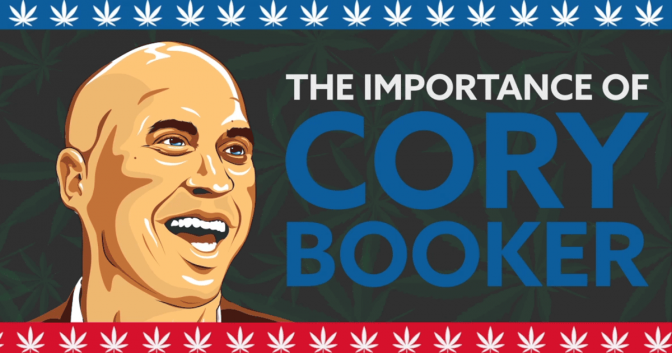The Importance of Cory Booker

For the modern movement to end cannabis prohibition, Sen. Cory Booker checks off all the boxes when it comes to being an all-star.
The New Jersey Democrat, born in 1969, has lived a remarkable political arc, beginning with outstanding scholarship at Stanford University, attending Oxford University on a Rhodes scholarship and graduating from Yale Law School in 1997. A year later, Booker, not even 30, was elected to Newark’s City Council. In 2006, he became the city’s youngest-ever mayor. Booker received national media attention for the innovative and successful public policies he championed, which put him in position to win a special election for the Senate in 2013 after the death of incumbent Democrat Frank Lautenberg.
From his early days on the City Council, while addressing Newark’s then-rampant crime problems, Cory Booker readily embraced “harm reduction” policies rather than the “arrest and lock them up” mentality long championed by police, prosecutors and prison officials. During his seven years as mayor, he worked with the Drug Policy Alliance to help Newark become a vanguard urban community.
In succeeding Lautenberg, Booker replaced the author of one of the worst and most pernicious pieces of anti-cannabis legislation ever passed by Congress: the 1991 Solomon-Lautenberg amendment (a.k.a. “Smoke a Joint, Lose Your License”), which forces states to suspend the licenses of drug convicts for six months. The law doesn’t require any proof that the offender was driving while impaired, unlike the laws regarding driving under the influence of alcohol.
Almost immediately after he was elected, Cory Booker introduced numerous criminal-justice reform bills, notably addressing prison sentencing and racial arrest disparities. He and Sen. Kirsten Gillibrand (D-N.Y.) sponsored the CARERS (Compassionate Access, Research Expansion and Respect States) Act in 2015, which would reschedule marijuana so states with medical programs wouldn’t have to worry about federal enforcement. It was reintroduced in June.
“Federal marijuana policy has long overstepped the boundaries of common sense, fiscal prudence and compassion,” Booker stated at the time. “This bill will help ensure that people who can benefit from medical marijuana—from children suffering from chronic illnesses to veterans battling PTSD—can do so without worrying about the federal government standing in the way.”
On Aug. 1, Cory Booker took a more dramatic step, introducing the Marijuana Justice Act, a groundbreaking and far-reaching bill that would remove cannabis from the Controlled Substances Act, effectively “making it legal at the federal level,” according to a Senate press release. It would also “incentivize states through federal funds to change their marijuana laws if those laws were shown to have disproportionate effect on low-income individuals and/or people of color.”
The bill would also expunge federal convictions for marijuana use and possession, and prisoners serving time for a pot offense would be entitled to a resentencing hearing. Those affected by a disproportionate racial arrest or imprisonment rate would be able to sue. A Community Reinvestment Fund would be established to “reinvest in communities most affected by the War on Drugs,” for everything from re-entry programs for prisoners to public libraries.
“Our country’s drug laws are broken and need to be fixed,” Booker explained. “They don’t make our communities safe. Instead, they divert critical resources from fighting violent crimes, tear families apart, unfairly impact low-income communities and communities of color, and waste billions in taxpayers dollars each year.
“Descheduling marijuana and applying that change retroactively to people currently serving time for marijuana offenses is a necessary step in correcting this unjust system. States have so far led the way in reforming our criminal-justice system, and it’s about time the federal government catches up and begins to assert leadership.”
Regrettably, Booker’s Marijuana Justice Act has virtually no chance of passage in the Republican-controlled Congress or of being signed by a decidedly anti-marijuana President. However, the very introduction of such a profoundly anti-prohibition bill into the staid and generally conservative Senate is definitely a bellwether for future reform legislation and the eventual end of America’s 80-year-long outlawing of cannabis.
Booker says he’s a complete teetotaler. “I’ve never smoked marijuana,” he told Vice in October. “I’ve never smoked a cigarette. I’ve never eaten marijuana. I’ve never tried another drug. I’ve never drank alcohol. This, to me, is not an issue I come at through my own experimentation. I come at this as an issue of justice, as an issue of safety for our communities, as an issue of utter fairness.“This is the beginning of a journey,” he continued. “I don’t see the pathway to passage [of the Justice Act] right now. But I know that the first abolitionists that got together and started fighting for abolition didn’t see the likelihood of passage in Congress at that point. And that the first activists that started pressing for voting-rights legislation and civil-rights legislation didn’t see a pathway.
“It’s going to be a far shorter journey than many may think. Millennials in this country, Republicans and Democrats, overwhelmingly believe in legalization. So we’re getting there, and as experiments in a dozen-plus states continue to forge forward on medical marijuana, and as decriminalization and legalization begin to show more instructive ways for dealing with marijuana, I think the momentum for our movement is going to continue.”

Sen. Booker with Freedom Leaf’s Chris Thompson
NORML members got to rub shoulders with Booker and other pro-legalization Congress representatives during the organization’s Lobby Day in September. A group photo was taken, and the senator posed for plenty of selfies.
“Meeting Sen. Booker was an amazing opportunity,” says Chris Thompson, Freedom Leaf’s director of digital marketing, who attended both the NORML Conference and Lobby Day. “He was extremely genuine, listened to stories from NORML chapters around the country and explained his new legalization bill to us.
«The Senator was very gracious with his time, offering to take selfies with everyone. When it was my turn, he asked me where I was from and made jokes with me while we took the picture. Overall, it was an awesome meeting, and I’m so thankful to NORML for setting it up.”
Clearly, Sen. Booker is a favorite among legalizers across the nation. His support for the cause is a reminder of how the drug war has devastated minority communities.
“There’s no time like the present to advocate for what’s right, to advocate for justice,” he says with the faith of a true believer. “There’s no doubt in my mind that the federal government shouldn’t be in the marijuana-prohibition business.”
Cory Booker for President?
Asked on CNN in July if he would run for President in 2020, Sen. Booker commented, “I don’t know what the future’s going to bring. If I start thinking about the future like that or engaging in that stuff, I think it would make me less of a senator. I’m a guy that’s going to criticize policies that, frankly, in a lot of states that are important for presidential elections would find that very much of a threat. My loyalty is to the position I’m in right now.”
Currently, the political figures considered to have the best chances of defeating Donald Trump include Booker; fellow senators Elizabeth Warren (D-Mass.), Kamala Harris (D-Calif.) and Bernie Sanders (I-Vt.); former Vice President Joe Biden; and former First Lady Michelle Obama.


